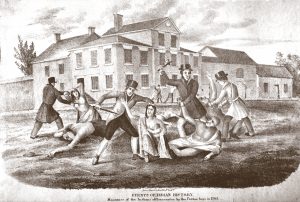
Massacre of the Conestogas. Illustrated with eight fine engravings. Lancaster: G. Hills, 1841. James Wimer. Digital image from the Pennsylvania Historical and Museum Commission.
Digital Paxton is a digital collection, scholarly edition, and teaching platform devoted to Pennsylvania’s first major pamphlet war. The “Paxton” in Digital Paxton refers to a little-known massacre in colonial Pennsylvania that unfolded in December 1763, when a mob of settlers from Paxtang Township murdered 20 unarmed Susquehannock Indians in Lancaster County. A month later, hundreds of “Paxton Boys” marched toward Philadelphia to menace refugee Indians who sought the protection of the Pennsylvania government. While Benjamin Franklin halted the march just outside of Philadelphia in Germantown, supporters of the Paxton Boys and their critics spent the next year battling in print. The pamphlet war that followed in 1764 was not so different from the Twitter wars of today. Pamphleteers waged battle using pseudonyms, slandering opponents as failed elites and racial traitors. At stake was much more than the conduct of the Paxton men. Pamphleteers staked claims about colonization, peace and war, race and ethnicity, masculinity and civility, and religious association in pre-Revolutionary Pennsylvania.
To support interdisciplinary study of this formative print debate, Digital Paxton makes freely available more than 2,500 pages of print-quality scans from eighteen different archives, research libraries, and cultural heritage institutions; contextualizes materials with twelve essays from leading historians and literary scholars; and scaffolds the collection with six lessons from secondary and post-secondary educators.
